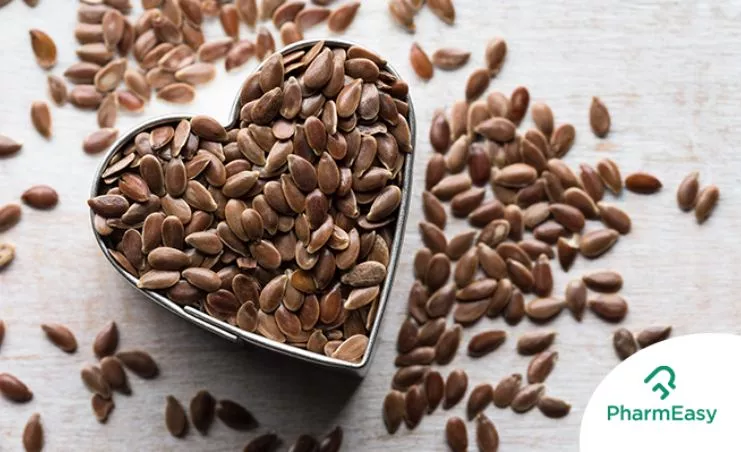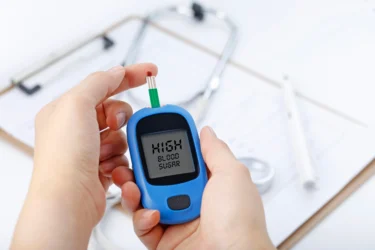Flax seeds (Alsi): Research-Backed Health Benefits
By Dr Prachi Garg +2 more

Get,

to manage your symptom
Get your,


4 Cr+ families
benefitted

OTP sent to 9988776655



You’ve successfully subscribed to receive
doctor-approved tips on
Whatsapp

Get ready to feel your best.

Hi There,
Download the PharmEasy App now!!


Register to Avail the Offer
Send OTPBy continuing, you agree with our Privacy Policy and Terms and Conditions

Hi There,
Sign up on PharmEasy now!!
Trusted by 4 crore+ families

OTP sent to 9988776655



You have unlocked 25% off on medicines




Code: NU25
By Dr Prachi Garg +2 more
Table of Contents
As scientific research expands its area of interest, many food items are coming into the limelight. Flaxseeds are one such item. Considered a ‘superfood,’ they have been prized for their amazing health benefits for centuries. So much so that their scientific name, Linum Usitatissimum, means ‘the most useful Linum1.’
The flax plant (also known as Linum usitatissimum) grows to reach about 2 feet tall and produces flaxseed. It was most likely first planted in Egypt, although it is now grown all over the world.

Flaxseeds contain a good amount of protein, dietary fibre, B vitamins and minerals like iron, calcium, magnesium, phosphorus and potassium. Flaxseeds also contain high levels of Omega-3 fatty acids ( mostly ALA- Alpha-Linolenic Acid)2.
Flaxseeds are your best friends when it comes to stress reduction. In addition to their omega-3 fatty acids, which have been shown to reduce stress and anxiety, flaxseeds are also high in magnesium, a mineral that can help regulate cortisol levels in the body9.
Dr. Anuja Bodhare, B.A.M.S, M.D (Ayu).

Flaxseeds are rich in both soluble and insoluble dietary fibre. Insoluble fibre absorbs a lot of water and increases the bulk of faeces. This maintains regular bowel movements and prevents constipation. They are very useful for people suffering from Irritable bowel syndrome (IBS)1.
Soluble fibre slows our digestion and reduces cholesterol and blood sugar levels. This reduces the chances of cardiovascular diseases and is helpful for people with Diabetes Mellitus.

Alpha-Linolenic Acid (ALA), the Omega-3 fatty acid present in high quantities in flaxseeds, prevents the deposition of cholesterol in the blood vessels of the heart. It is also effective in reducing inflammation in the arteries3.
Soluble fibre and proteins in Flaxseeds are also responsible for the reduction of cholesterol levels in our blood. Flaxseed consumption is also known to reduce blood pressure.

Plant compound, Lignans are present in Flaxseeds. As per research, Lignans were found to be effective in reducing the risk of breast cancer in women and prostate cancer in men4.
Flaxseeds also contain Omega-3 fatty acids and proteins in high amounts. These proteins and Omega-3 fatty acids were found to prevent the development of tumours, further reducing any risk of cancer.

The soluble fibre in flaxseeds improves blood sugar levels by slowing down digestion. Thus, it helps in the management of type 2 diabetes mellitus5.

Proteins in flaxseeds contain amino acids like Arginine, Aspartic acid and Glutamic acid. These amino acids were found to protect our body from a variety of fungal Infections, thus improving our overall immunity6.

The soluble fibre in flaxseeds slows our digestion. This makes us feel full for a long period of time7.
Satiety, thus improved, reduces hunger. It further reduces our food intake, in turn reducing the number of calories consumed by our body every day. This results in the reduction of weight

Reduction in blood pressure due to consumption of flaxseeds reduces the risk of stroke.

Hot flashes and night sweats are common symptoms observed in women, going through menopause.
Lignans, the plant compounds present in flaxseeds have a weak oestrogen effect. As per research, this oestrogen effect of Lignans was found to ease hot flashes in post-menopausal women8.
Did you know that flaxseeds may help stop excessive bone turnover, which may increase your bone density over time? That’s right – these tiny seeds are packed with nutrients that are essential for bone health, including magnesium, phosphorus and omega-3 fatty acids10.
Dr. Smita Barode, BAMS
Flaxseeds a simple ingredient to support your brain health. Flaxseeds are packed with omega-3 fatty acids, which are essential for maintaining healthy brain function. Consuming flaxseeds may improve cognitive function, memory and overall brain health11.
Dr. Siddharth Gupta, B.A.M.S, M.D (Ayu)
Ground flaxseeds are best stored by keeping them in airtight containers and refrigerating them.
If you’re looking to improve your facial appearance naturally, flaxseed oil maybe a good natural option. This oil is packed with essential fatty acids, which help hydrate and nourish the skin from within11.
Dr. Rajeev Singh, BAMS
Also Read: Chia Seeds for Weight Loss: Benefits, How to Use Them & Best Ways to Eat Them
Higher doses of flaxseeds may cause side effects like diarrhoea, nausea, stomach pain, flatulence, bloating etc.
Disclaimer: The information provided here is for educational/awareness purposes only and is not intended to be a substitute for medical treatment by a healthcare professional and should not be relied upon to diagnose or treat any medical condition. The reader should consult a registered medical practitioner to determine the appropriateness of the information and before consuming any medication. PharmEasy does not provide any guarantee or warranty (express or implied) regarding the accuracy, adequacy, completeness, legality, reliability or usefulness of the information; and disclaims any liability arising thereof.
Links and product recommendations in the information provided here are advertisements of third-party products available on the website. PharmEasy does not make any representation on the accuracy or suitability of such products/services. Advertisements do not influence the editorial decisions or content. The information in this blog is subject to change without notice. The authors and administrators reserve the right to modify, add, or remove content without notification. It is your responsibility to review this disclaimer regularly for any changes.
Comments

Leave your comment...
You may also like
Comments